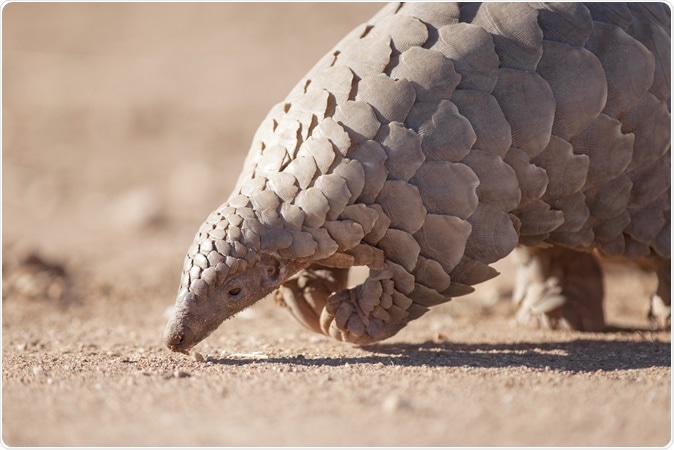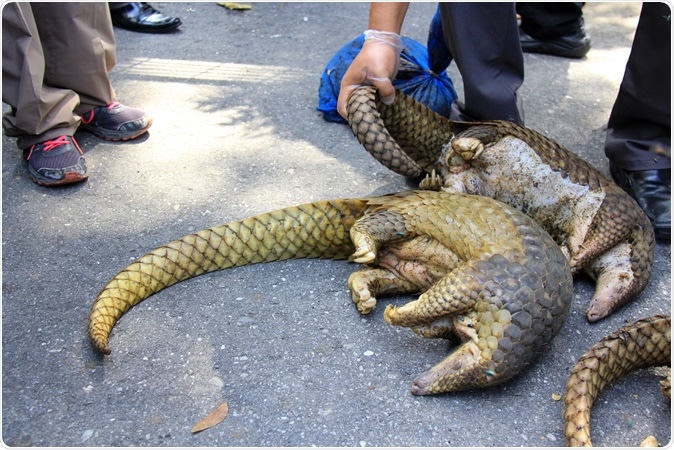They identified genetic differences between pangolins and other mammals that may account for why pangolins tolerate and survive coronavirus, thereby providing a starting point for understanding the immune response in humans and potential options for treatment.

A Pangolin. Image Credit: 2630ben / Shutterstock
Viral infection usually induces an immune response
In most mammals, once a virus has entered the body, genes that can sense its presence "alert" the immune system of an invader and induce an immune response.
However, according to an article recently published in the journal Frontiers in Immunology, two of these virus-sensing genes are missing in the scaly, anteater-like pangolins.
The paper has so far been provisionally accepted, but the formatted version of the article will be available soon.
Trafficking of pangolins
Pangolins are frequently illegally trafficked in Asia, both because they are considered a delicacy and because their scales are used in traditional Chinese medicine.

Pekanbaru City, Riau, Indonesia - Pangolins are frequently illegally trafficked in Asia. Image Credit: Arief Budi Kusuma / Shutterstock
The finding that pangolins lack two virus-sensing genes is essential, since, although these exotic animals are carriers of coronavirus, they seem to survive and tolerate the infection for reasons that researchers do not yet understand.
Leopold Eckhart and colleagues focused their attention on pangolins since they may have transmitted coronavirus to people, thereby enabling the jump between species that led to the COVID-19 outbreak.
"Pangolins were recently identified as carriers and intermediate hosts of coronaviruses," writes Leopold Eckhart and colleagues.
Potential evolutionary advantage
Eckhart and team are interested in understanding the evolutionary advantage possessed by pangolins that makes them able to tolerate coronavirus because this may point to potential treatment approaches in human case of infection.
Research has previously shown that on entering the body, coronaviruses induce an innate immune response when intracellular double-stranded viral RNA is detected, via the interferon-induced with helicase C domain 1 (IFIH1).
Now, the team has carried out a genomics analysis of three species of pangolins and compared the findings with the genome sequences of other animals, including cats, dogs, and humans.
Their comparative analysis of RNA sensor genes found that one called DDX58/RIG-I, which senses viral single-stranded RNA in the cytoplasm is conserved in pangolins, as are certain members of the toll-like receptor superfamily (3, 7 and 8), which bind to RNA in the endosome.
Interestingly, the team found that mutations present in pangolins had inactivated the viral sensor IFIH1.
Similarly, the ZBP1 gene, which codes for the Z-DNA-binding protein (ZBP1) that senses alternative double helix conformations - Z-DNA and Z-RNA - had also been lost at some point in the pangolin's evolution.
The pangolin reacts differently to viruses, compared with other mammals
The findings indicate that the innate immune response to viruses in pangolins is significantly different from that in other mammalian species, including humans.
"We put forward the hypothesis that loss of IFIH1 and ZBP1 provided an evolutionary advantage by reducing inflammation-induced damage to host tissues and thereby contributed to a switch from resistance to a tolerance of viral infections in pangolins," writes the team.
Eckhart says the study demonstrates that pangolins have lived for millions of years without having the same antiviral immune defense as other mammals.
"Further studies of pangolins will uncover how they manage to survive viral infections, and this might help to devise new treatment strategies for people with viral infections," he adds.
Suppressing the cytokine storm in humans
In humans, infection with coronavirus can trigger a cascade of inflammatory reactions referred to as a cytokine storm, which then worsens patient outcomes.
Eckhart and colleagues suggest that suppressing gene signaling with pharmaceutical agents could potentially be an approach to treating acute cases of coronavirus disease 2019 (COVID-19). However, Eckhart warns that this approach could increase susceptibility to further infections.
He advises that the main goal would be to dampen the immune response to the virus while keeping the pathogen under control. He points out that an overactivated immune response can be tapered by making it less intense or by changing its timing.
The implications of the study
Although Eckhart and the team established genetic differences in pangolins, compared with other mammals, they did not explore the effects these differences have on how the immune system responds to a virus.
Researchers do not yet know precisely how the missing gene sensors enable pangolins to survive coronavirus; they only now that their absence is somehow involved.
Eckhart says that the RIG-I gene-sensor should also be investigated further for any associated protective role in cases of coronavirus.
The current study serves as a foundation for further understanding the features of coronavirus, how the immune system responds to it, and potential new treatment options.